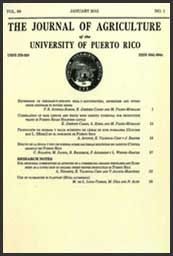Abstract
Hyparrhenia rufa (Nees) Stapf., commonly known as jaragüa, faragüa or yaragüa grass, is an aggressive weed that has invaded cropland in Puerto Rico. To reduce the application of herbicides, the use of phytopathogenic fungi has been proposed for its control. Four fungal isolates associated with foliage lesions of H. rufa were identified as Curvularia sp., Fusarium sp., Phoma sorghina and Sphaeropsis sp. Their pathogenicity was tested under laboratory, greenhouse and field conditions. All fungal species were pathogenic in wounded tissues under laboratory conditions, whereas P. sorghina and Sphaeropsis sp. were the most virulent species under greenhouse conditions. Fusarium sp. was the most virulent in a field assay. All fungal isolates showed low levels of infection (level 1) in the field. Disease severity was estimated at 25% of the experimental plot area. To comply with Koch's postulates, all inoculated fungi were re-isolated on potato dextrose agar after pathogenicity tests conducted under laboratory, greenhouse and field conditions. This is the first report of Curvularia sp., Fusarium sp., P. sorghina and Sphaeropsis sp. as foliar pathogens of H. rufa.Downloads
Download data is not yet available.

